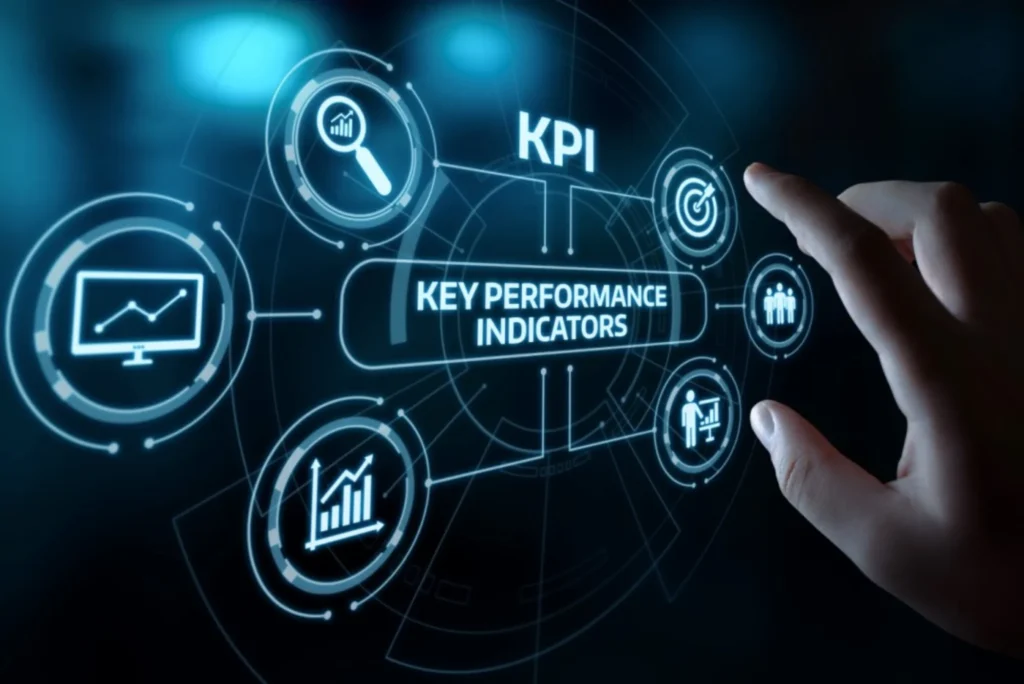In the dynamic realm of digital marketing, understanding and harnessing the power of Key Performance Indicators (KPIs) is crucial for driving success. Whether you’re a burgeoning startup or an established enterprise, comprehending the intricacies of KPIs can significantly impact your marketing endeavors. Let’s delve into what KPIs are and why they are indispensable in the digital marketing landscape.
Defining KPIs in Digital Marketing
What are KPIs?
KPIs are quantifiable metrics used to gauge the performance and effectiveness of various aspects of a digital marketing campaign. Unlike generic metrics, KPIs are specifically tailored to align with business objectives and provide actionable insights for strategic decision-making.
How KPIs Differ from Metrics and Objectives
While metrics are measurable data points that track specific activities or outcomes, objectives are the overarching goals a business aims to achieve. KPIs bridge the gap between metrics and objectives by focusing on the most critical indicators that directly contribute to business success.
Significance of KPIs in Measuring Success
KPIs serve as a compass, guiding marketers towards their desired outcomes by offering quantifiable benchmarks for progress. By tracking KPIs, businesses can assess the efficacy of their digital marketing efforts and make informed adjustments to optimize performance.
Types of KPIs in Digital Marketing
Acquisition KPIs
Acquisition KPIs revolve around acquiring new customers and driving traffic to digital platforms. Metrics such as website visits, click-through rates, and conversion rates are essential for evaluating the effectiveness of marketing channels and campaigns.
Engagement KPIs

Engagement KPIs focus on measuring the level of interaction and involvement users exhibit with digital content. Metrics like bounce rate, time spent on site, and social media engagement metrics provide insights into the effectiveness of content strategies and user experience.
Conversion KPIs
Conversion KPIs track the progression of users through the sales funnel, from initial engagement to final conversion. Metrics such as conversion rates, lead generation, and sales revenue help assess the efficiency of marketing tactics in driving conversions and generating revenue.
Retention KPIs
Retention KPIs evaluate the ability of a business to retain customers and foster long-term relationships. Metrics like customer lifetime value, repeat purchase rate, and churn rate offer insights into customer loyalty, satisfaction, and overall business sustainability.
Importance of KPIs for Businesses
Streamlining Decision-making Processes
KPIs provide marketers and business leaders with actionable data that facilitates informed decision-making. By focusing on the most relevant KPIs, businesses can prioritize initiatives that yield the highest return on investment (ROI) and allocate resources effectively.
Aligning Marketing Efforts with Business Objectives
KPIs serve as a direct link between marketing activities and overarching business goals. By aligning KPIs with strategic objectives, businesses can ensure that their digital marketing efforts contribute directly to organizational success and growth.
Enhancing Accountability and Performance Tracking
KPIs establish accountability within marketing teams by setting clear performance targets and measuring progress against predefined benchmarks. Regular monitoring and analysis of KPIs enable businesses to identify areas for improvement and optimize marketing strategies for maximum impact.
Implementing KPIs in Digital Marketing
Setting SMART Goals
When implementing KPIs, it’s essential to set SMART goals that are Specific, Measurable, Achievable, Relevant, and Time-bound. By defining clear objectives and corresponding KPIs, businesses can track progress effectively and measure success accurately.
Choosing Appropriate KPIs for Different Channels
Different digital marketing channels require different sets of KPIs based on their unique characteristics and objectives. Whether it’s email marketing, social media, SEO, or paid advertising, selecting the right KPIs ensures that efforts are aligned with channel-specific goals and audience expectations.
Utilizing Tools and Analytics Platforms
Utilizing advanced analytics tools and platforms allows businesses to collect, analyze, and interpret data accurately. From Google Analytics to social media insights and marketing automation software, these tools provide valuable insights that inform strategic decision-making and optimize campaign performance.
Case Study: Utilizing KPIs for Success
Example of “Best Digital Marketing Agency in Bangalore”
The Best Digital Marketing Agency in Bangalore exemplifies how strategic utilization of KPIs can propel a business to the forefront of its industry. Specializing in comprehensive digital marketing solutions, this agency has distinguished itself as a leader in the competitive landscape of Bangalore’s vibrant business scene.
Leveraging KPIs for Measurable Success
At the core of the agency’s success lies a meticulous approach to KPI tracking and analysis. By closely monitoring acquisition, engagement, conversion, and retention metrics, the agency gains invaluable insights into the effectiveness of its marketing initiatives.
Acquisition KPIs:
Through targeted SEO strategies, PPC campaigns, and social media advertising, the Best Digital Marketing Agency in Bangalore effectively attracts qualified leads and expands its client base. By tracking metrics such as website traffic, lead generation, and cost per acquisition (CPA), the agency optimizes its acquisition channels to ensure maximum return on investment.
Engagement KPIs:
The agency understands the importance of engaging with its audience across various digital platforms. By analyzing metrics such as bounce rate, time on site, and social media engagement rates, it tailors content and communication strategies to foster meaningful interactions with prospects and clients alike.
Conversion KPIs:
Driving conversions is paramount to the agency’s success. Through continuous A/B testing, conversion rate optimization, and personalized marketing campaigns, it maximizes the efficiency of its sales funnel. By tracking metrics like conversion rates, lead-to-customer ratios, and average order value, the agency fine-tunes its strategies to enhance conversion outcomes.
Retention KPIs:
Maintaining long-term client relationships is a cornerstone of the agency’s business model. By focusing on retention metrics such as customer lifetime value, churn rate, and customer satisfaction scores, it ensures client loyalty and fosters a positive reputation within the industry.
Continuous Optimization and Growth
Armed with actionable insights from KPI analysis, the Best Digital Marketing Agency in Bangalore continuously refines its strategies to stay ahead of the curve. Whether it’s implementing innovative marketing tactics, adopting emerging technologies, or refining client communication channels, the agency remains at the forefront of digital marketing excellence in Bangalore.
Case Study: “Abdul Sattar Typing Centre”
The story of Abdul Sattar Typing Centre provides a compelling example of how a local business can harness the power of KPIs to thrive in the digital age. Situated in the heart of Bangalore, Abdul Sattar Typing Centre has been a trusted provider of typing services for over a decade.
Embracing Digital Transformation
Recognizing the evolving landscape of business operations, Abdul Sattar Typing Centre embarked on a journey of digital transformation to expand its reach and enhance its service offerings. With a focus on leveraging digital marketing strategies, the centre aimed to attract new customers and streamline its operations for greater efficiency.
Leveraging KPIs for Online Visibility
At the core of Abdul Sattar Typing Centre’s digital marketing efforts lies a strategic approach to KPI tracking and analysis. By closely monitoring key metrics such as website traffic, search engine rankings, and online reviews, the centre gains valuable insights into its online visibility and brand perception.
Optimizing Customer Engagement
Engaging with customers is essential for Abdul Sattar Typing Centre to maintain a competitive edge in the digital landscape. Through targeted email campaigns, social media interactions, and personalized communication channels, the centre fosters meaningful connections with its clientele. By tracking metrics such as click-through rates, engagement levels, and customer feedback scores, it continuously refines its engagement strategies to meet the evolving needs of its customers.
Enhancing Service Offerings
In response to shifting market demands, Abdul Sattar Typing Centre diversified its service offerings to cater to a broader audience. By introducing online booking systems, document management solutions, and virtual consultation services, the centre expanded its reach beyond its physical location. Through KPI analysis, it gauges the effectiveness of these initiatives in driving customer satisfaction, retention, and revenue growth.
Community Engagement and Reputation Management

Abdul Sattar Typing Centre recognizes the importance of building a positive reputation within the local community. By actively participating in community events, sponsoring local initiatives, and soliciting customer feedback, the centre fosters trust and credibility among its target audience. Through KPI tracking, it measures its reputation scores, referral rates, and online sentiment to gauge the impact of its community engagement efforts.
Challenges and Pitfalls in KPI Measurement
Data Accuracy and Reliability Issues
One of the primary challenges in KPI measurement is ensuring the accuracy and reliability of data sources. Inaccurate or incomplete data can skew KPI results and lead to misguided decisions. Implementing robust data validation processes and investing in reliable analytics tools can help mitigate this challenge.
Overlooking Qualitative Aspects of Performance
While KPIs provide valuable quantitative insights, they often overlook qualitative aspects of performance, such as brand sentiment and customer satisfaction. Businesses must strike a balance between quantitative and qualitative metrics to gain a comprehensive understanding of their overall performance and customer perception.
Avoiding Vanity Metrics
Vanity metrics, such as likes, shares, and followers, can be misleading indicators of success if not contextualized within the broader business objectives. Instead, businesses should focus on meaningful KPIs that directly contribute to tangible outcomes, such as revenue growth, customer acquisition, and retention.
Key Performance Indicators (KPIs) are indispensable tools for measuring and optimizing digital marketing performance. By defining clear objectives, selecting relevant KPIs, and leveraging advanced analytics tools, businesses can gain valuable insights into their marketing efforts and drive sustainable growth. Whether you’re the Best Digital Marketing Agency in Bangalore or a local establishment like Abdul Sattar Typing Centre, understanding and harnessing the power of KPIs can propel your digital marketing endeavors to new heights of success.











